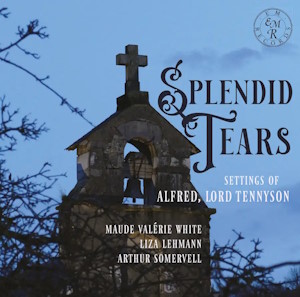
Splendid Tears
Settings of Alfred, Lord Tennyson
Maude Valerie White (1855-1937)
Four songs from Tennyson’s In Memoriam (1885)
Lisa Lehmann (1862-1918)
In Memoriam – A Song Cycle (1899)
Sir Arthur Somervell (1863-1937)
Cycle of Songs from Tennyson’s Maud (1898)
Brian Thorsett (tenor)
Richard Masters (piano)
rec. 2022, Creativity and Innovation District LLC Building, Virginia Tech, Blacksburg, USA
Texts included
EM Records EMRCD087 [80]
Whilst both Arthur Somervell’s cycle Maud and Liza Lehmann’s In Memoriam have been recorded before, this is the first time they’ve been recorded by a tenor. In the case of Maude Valérie White’s Four Songs from In Memoriam, this is the world premiere recording.
Somervell’s cycle was composed in 1898 and though it’s never been in any way central to the British song repertoire it has attracted a number of important performers. In more recent years it’s been recorded by Roderick Williams and Susie Allan (Somm), David Wilson-Johnson and David Owen Norris (Hyperion Helios), John Carol Case and Daphne Ibbott (Heritage) and Henry Wickham and Susie Allan (her first recording of it, for Meridian). The very first recording was actually made by Roy Henderson and Eric Gritton for Decca during the war but remained unissued, though it does exist and I’ve heard it. The whole cycle has inevitably been transposed in full for the tenor of Brian Thorsett, so direct comparisons between voice types are not necessarily helpful.
Thorsett and pianist Richard Masters, an occasional contributor to this website, have spent much time investigating British song from Purcell and Arne forward. So the two Americans’ joint note outlining the reasons for the compilation of this disc can be read in that context – though I hope we’re long past the insularity problem of national song. After all, it’s been 70 years since the Bostonian George Maran recorded On Wenlock Edge. I wish I could be more sympathetic to Thorsett, though, in Somervell. When he sings softly, he’s fine and his diction is good. Elsewhere one finds an essentially reedy, nasal light tenor subject to strain, one that tightens in declamatory songs (A Voice by the Cedar Tree) and that can lack variety of tone or mood (I Have Led Her Home). At the crests of phrases, as in Come into the Garden, Maud, things are problematic and when the voice hardens it is stressed.
The Lehmann cycle is surprisingly dramatic, the opportunities for piano quite considerable. A song such as When on my Bed the moonlight Falls is sensitively shaped, the music reflective and introspective. The piano trills in Wild Bird, Whose Warble, Liquid Sweet are deftly done and throughout Masters’ playing is admirably sensitive to nuance, atmosphere and colouration. Thorsett is prone to be histrionic in To Sleep and he pushes his voice in Who Loves Not Knowledge. In general, perhaps because there is a greater equality between piano and voice in this cycle, Thorsett seems rather more at home stylistically and vocally than in the Somervell. Incidentally, this cycle was transposed but only in part. It’s noted that it was decided not to perform the spoken epilogue – which seems to me fair enough – and that there is a ‘small cut’ about which nothing more is said in the notes. This, however, turns out to be a complete song, Strong Son of God, about the omission of which I am not quite so happy, even if the total timing of the disc is nearly 80 minutes.
The previously unrecorded Maude Valérie White cycle is sung in the original key except for the last of the four songs, Be Near me, When my Light is Low, sung in F-sharp minor, which sits better for Thorsett. Masters is again excellent in characterising the music, and Thorsett responds to the songs’ romantic lines with devotional warmth, though I feel a slight strain in the third.
As usual with EM Records, documentation is first class and there are English texts. The recording is well-balanced. The competition may not be directly applicable, but at least three of the cited pairings in the Somervell are preferable, and Wickham and Allan have also recorded the Lehmann.
Jonathan Woolf
Previous review: John Quinn (September 2024)
Buying this recording via a link below generates revenue for MWI and helps us keep free access to the site



















